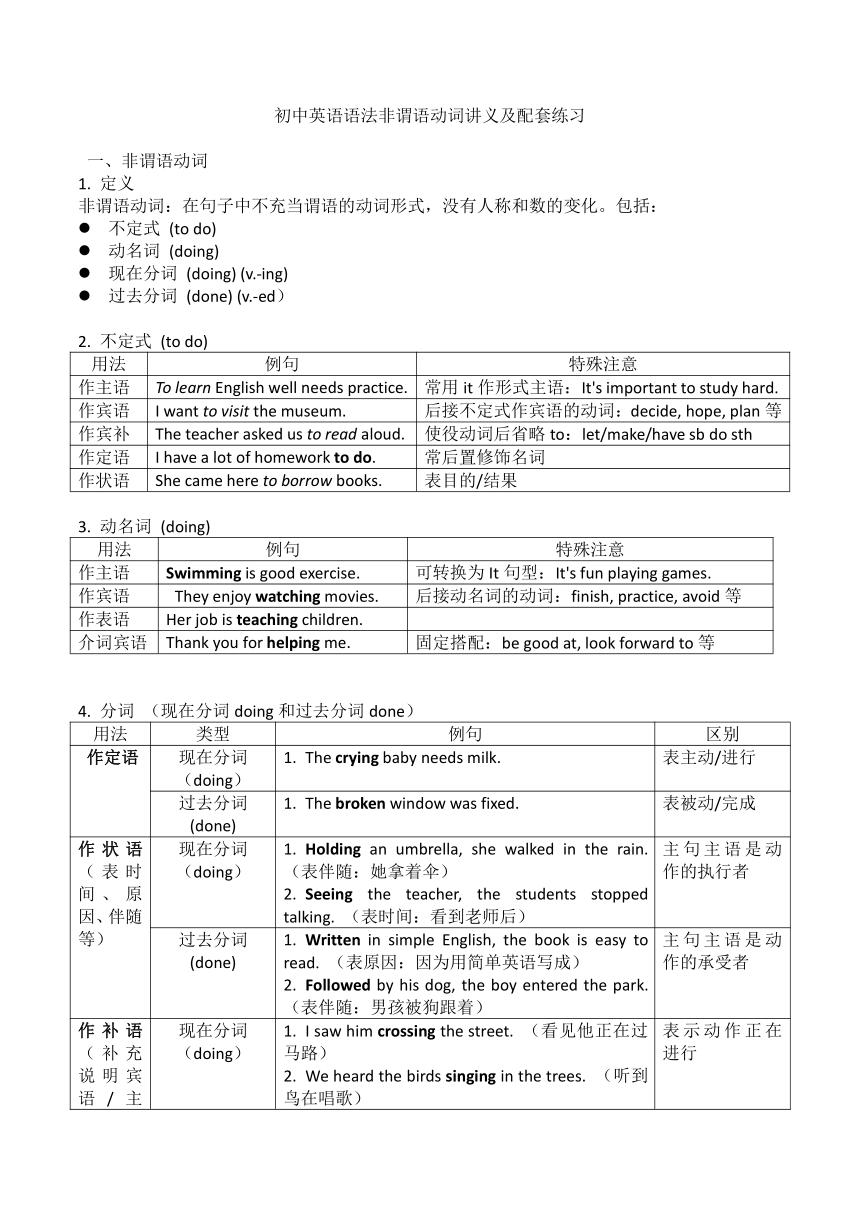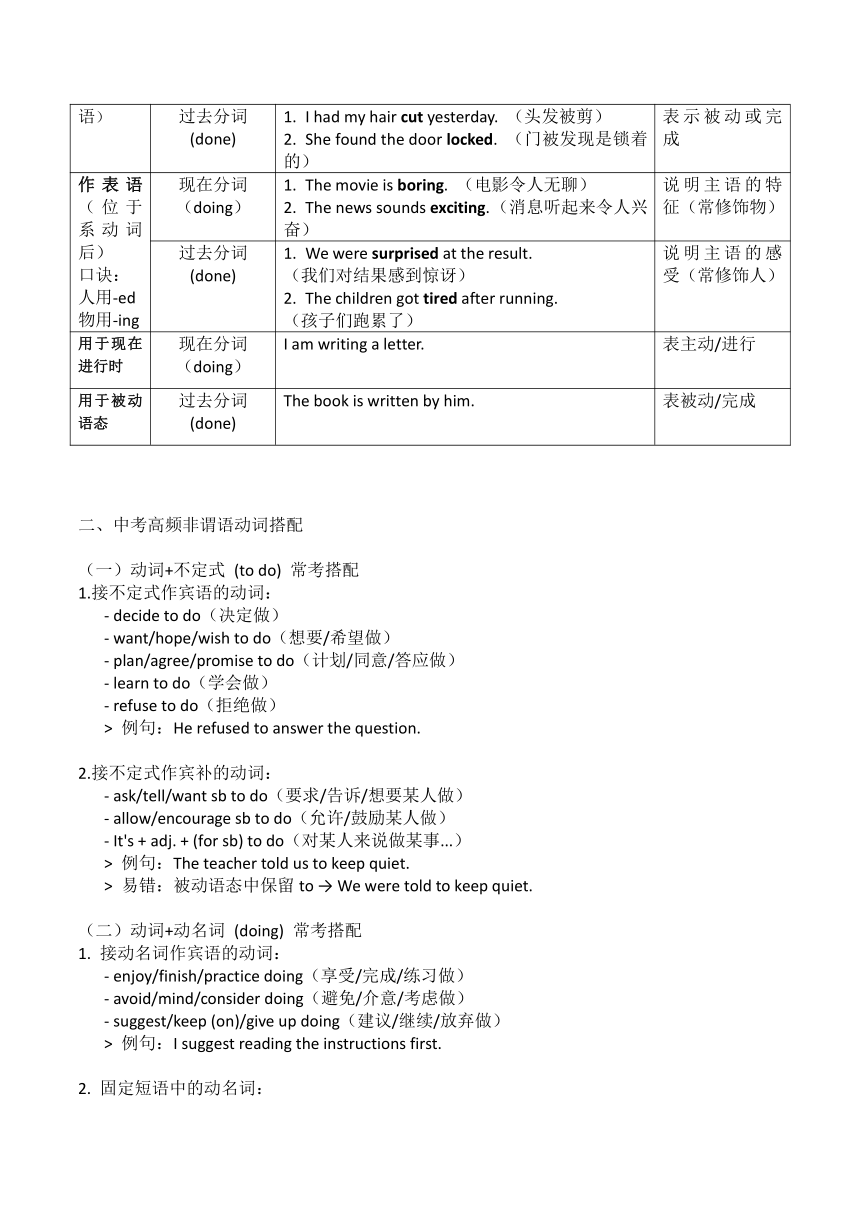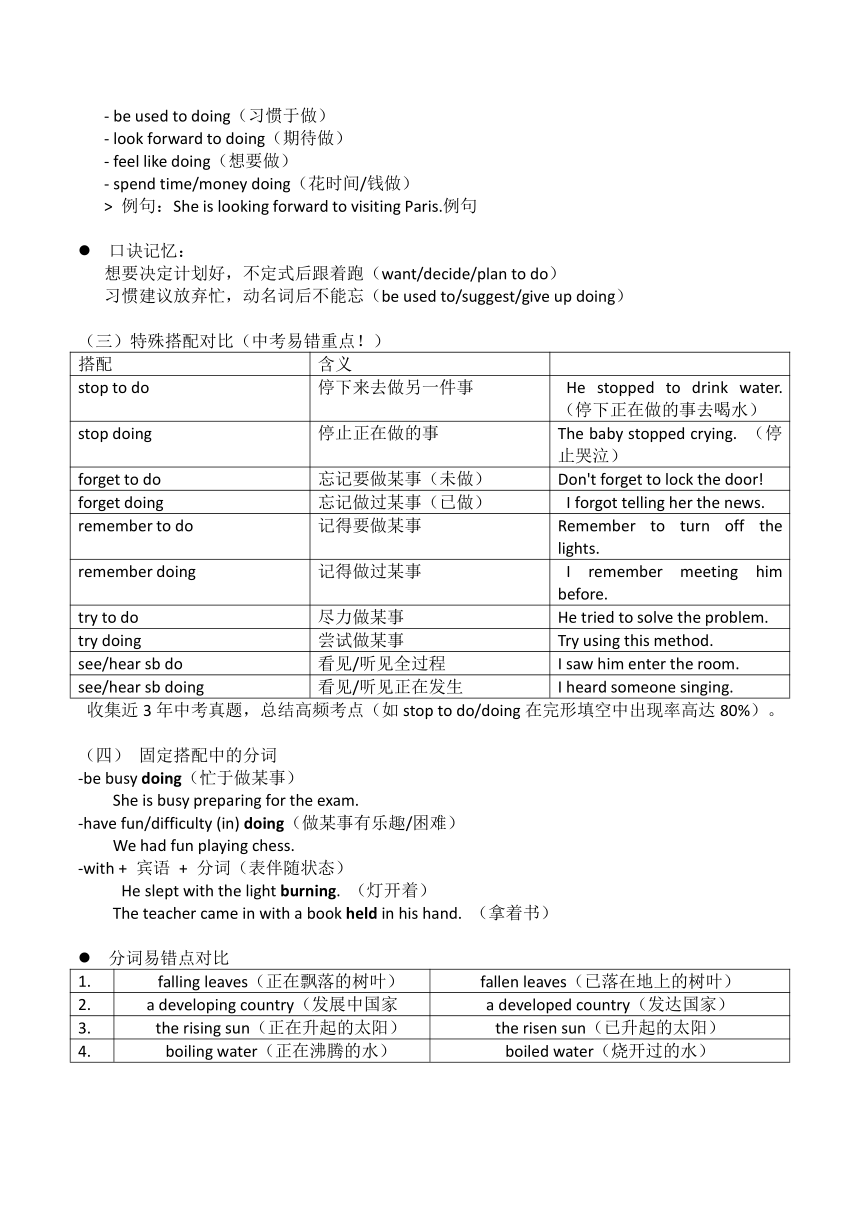2025年中考英语语法复习非谓语动词(含答案)
文档属性
| 名称 | 2025年中考英语语法复习非谓语动词(含答案) |

|
|
| 格式 | docx | ||
| 文件大小 | 26.3KB | ||
| 资源类型 | 教案 | ||
| 版本资源 | 人教版 | ||
| 科目 | 英语 | ||
| 更新时间 | 2025-03-17 00:00:00 | ||
图片预览



文档简介
初中英语语法非谓语动词讲义及配套练习
一、非谓语动词
1. 定义
非谓语动词:在句子中不充当谓语的动词形式,没有人称和数的变化。包括:
不定式 (to do)
动名词 (doing)
现在分词 (doing) (v.-ing)
过去分词 (done) (v.-ed)
不定式 (to do)
用法 例句 特殊注意
作主语 To learn English well needs practice. 常用it作形式主语:It's important to study hard.
作宾语 I want to visit the museum. 后接不定式作宾语的动词:decide, hope, plan等
作宾补 The teacher asked us to read aloud. 使役动词后省略to:let/make/have sb do sth
作定语 I have a lot of homework to do. 常后置修饰名词
作状语 She came here to borrow books. 表目的/结果
动名词 (doing)
用法 例句 特殊注意
作主语 Swimming is good exercise. 可转换为It句型:It's fun playing games.
作宾语 They enjoy watching movies. 后接动名词的动词:finish, practice, avoid等
作表语 Her job is teaching children.
介词宾语 Thank you for helping me. 固定搭配:be good at, look forward to等
分词 (现在分词doing和过去分词done)
用法 类型 例句 区别
作定语 现在分词 (doing) The crying baby needs milk. 表主动/进行
过去分词 (done) The broken window was fixed. 表被动/完成
作状语(表时间、原因、伴随等) 现在分词 (doing) Holding an umbrella, she walked in the rain. (表伴随:她拿着伞) Seeing the teacher, the students stopped talking. (表时间:看到老师后) 主句主语是动作的执行者
过去分词 (done) Written in simple English, the book is easy to read. (表原因:因为用简单英语写成) Followed by his dog, the boy entered the park. (表伴随:男孩被狗跟着) 主句主语是动作的承受者
作补语(补充说明宾语/主语) 现在分词 (doing) I saw him crossing the street. (看见他正在过马路) We heard the birds singing in the trees. (听到鸟在唱歌) 表示动作正在进行
过去分词 (done) I had my hair cut yesterday. (头发被剪) She found the door locked. (门被发现是锁着的) 表示被动或完成
作表语(位于系动词后) 口诀: 人用-ed 物用-ing 现在分词 (doing) The movie is boring. (电影令人无聊) The news sounds exciting. (消息听起来令人兴奋) 说明主语的特征(常修饰物)
过去分词 (done) We were surprised at the result. (我们对结果感到惊讶) The children got tired after running. (孩子们跑累了) 说明主语的感受(常修饰人)
用于现在进行时 现在分词 (doing) I am writing a letter. 表主动/进行
用于被动语态 过去分词 (done) The book is written by him. 表被动/完成
二、中考高频非谓语动词搭配
(一)动词+不定式 (to do) 常考搭配
1.接不定式作宾语的动词:
- decide to do(决定做)
- want/hope/wish to do(想要/希望做)
- plan/agree/promise to do(计划/同意/答应做)
- learn to do(学会做)
- refuse to do(拒绝做)
> 例句:He refused to answer the question.
2.接不定式作宾补的动词:
- ask/tell/want sb to do(要求/告诉/想要某人做)
- allow/encourage sb to do(允许/鼓励某人做)
- It's + adj. + (for sb) to do(对某人来说做某事...)
> 例句:The teacher told us to keep quiet.
> 易错:被动语态中保留to → We were told to keep quiet.
(二)动词+动名词 (doing) 常考搭配
1. 接动名词作宾语的动词:
- enjoy/finish/practice doing(享受/完成/练习做)
- avoid/mind/consider doing(避免/介意/考虑做)
- suggest/keep (on)/give up doing(建议/继续/放弃做)
> 例句:I suggest reading the instructions first.
2. 固定短语中的动名词:
- be used to doing(习惯于做)
- look forward to doing(期待做)
- feel like doing(想要做)
- spend time/money doing(花时间/钱做)
> 例句:She is looking forward to visiting Paris.例句
口诀记忆:
想要决定计划好,不定式后跟着跑(want/decide/plan to do)
习惯建议放弃忙,动名词后不能忘(be used to/suggest/give up doing)
(三)特殊搭配对比(中考易错重点!)
搭配 含义
stop to do 停下来去做另一件事 He stopped to drink water. (停下正在做的事去喝水)
stop doing 停止正在做的事 The baby stopped crying. (停止哭泣)
forget to do 忘记要做某事(未做) Don't forget to lock the door!
forget doing 忘记做过某事(已做) I forgot telling her the news.
remember to do 记得要做某事 Remember to turn off the lights.
remember doing 记得做过某事 I remember meeting him before.
try to do 尽力做某事 He tried to solve the problem.
try doing 尝试做某事 Try using this method.
see/hear sb do 看见/听见全过程 I saw him enter the room.
see/hear sb doing 看见/听见正在发生 I heard someone singing.
收集近3年中考真题,总结高频考点(如stop to do/doing在完形填空中出现率高达80%)。
(四) 固定搭配中的分词
-be busy doing(忙于做某事)
She is busy preparing for the exam.
-have fun/difficulty (in) doing(做某事有乐趣/困难)
We had fun playing chess.
-with + 宾语 + 分词(表伴随状态)
He slept with the light burning. (灯开着)
The teacher came in with a book held in his hand. (拿着书)
分词易错点对比
1. falling leaves(正在飘落的树叶) fallen leaves(已落在地上的树叶)
2. a developing country(发展中国家 a developed country(发达国家)
3. the rising sun(正在升起的太阳) the risen sun(已升起的太阳)
4. boiling water(正在沸腾的水) boiled water(烧开过的水)
三、练习题
(一)基础练习(填空)
1. My parents allow me ______ (choose) my own clothes.
2. I can't help ______ (laugh) when I watch comedies.
3. The book ______ (write) by Lu Xun is worth reading.
4. Don't forget ______ (bring) your ID card tomorrow!
5. We spent two hours ______ (prepare) for the party.
6. I decided ______ (join) the art club.
7. She avoided ______ (answer) the question.
8. The ______ (excite) news made us happy.
9. They practiced ______ ( sing) the song.
10. I heard someone ______ (call) my name.
(二)中考真题演练(单选)
1. —Would you mind ______ the window
—Of course not.
A. open B. opening C. to open
2. The teacher made the boy ______ the sentence three times.
A. copy B. to copy C. copying
3. I remember ______ the keys on the desk, but I can't find them now.
A. put B. putting C. to put
4. The boy lay on the grass, ______ at the stars.
A. looked B. looking C. to look
5. ______ from the top of the mountain, the city looks like a garden.
A. Seeing B. Seen C. To see
6. The teacher walked into the classroom, ______ by his students.
A. followed B. following C. to follow
(三)语篇练习一:校园生活
阅读短文,选择正确的非谓语动词形式:
Last week, our class decided 1. ______ (A. organize B. to organize C. organizing) a charity sale. Ms. Li suggested 2. ______ (A. collect B. collecting C. to collect) old books first. Some students offered 3. ______ (A. help B. to help C. helping) carry boxes.
During the event, I saw Jenny 4. ______ (A. draw B. drawing C. drawn) posters carefully. We heard people 5. ______ (A. praise B. to praise C. praising) our creative ideas. It's important 6. ______ (A. keep B. to keep C. keeping) the environment clean, so we avoided 7. ______ (A. use B. using C. to use) plastic bags.
Remember 8. ______ (A. donate B. to donate C. donating) the money to the children's hospital," our teacher reminded us. The experience made us 9. ______ (A. feel B. to feel C. feeling) proud. We look forward to 10. ______ (A. hold B. holding C. held) more meaningful activities.
语篇练习二:旅行经历
阅读日记,选择正确的非谓语动词形式:
Yesterday, my family planned 1. ______ (A. visit B. to visit C. visiting) the Great Wall. Dad refused 2. ______ (A. take B. taking C. to take) the cable car, saying it's better 3. ______ (A. walk B. walking C. to walk).
Halfway up, I stopped 4. ______ (A. drink B. to drink C. drinking) some water. Mom kept 5. ______ (A. encourage B. encouraging C. to encourage) me. Suddenly, we noticed a sign 6. ______ (A. warn B. warning C. warned) about steep steps.
The wind made us 7. ______ (A. shiver B. to shiver C. shivering). But the view was worth 8. ______ (A. see B. seeing C. seen). I'll never forget 9. ______ (A. stand B. to stand C. standing) on that ancient wall. Before leaving, we promised 10. ______ (A. protect B. to protect C. protecting) this wonder forever.
语篇练习三:日常活动
阅读邮件,选择正确的非谓语动词形式:
Hi Tom,
I'm writing 1. ______ (A. invite B. to invite C. inviting) you to my birthday party. Would you mind 2. ______ (A. bring B. to bring C. bringing) some snacks
Yesterday, I practiced 3. ______ (A. make B. making C. to make) a cake but ended up 4. ______ (A. burn B. burning C. burned) it. My mom offered 5. ______ (A. teach B. to teach C. teaching) me again.
Don't forget 6. ______ (A. wear B. to wear C. wearing) your new jacket! I remember 7. ______ (A. buy B. buying C. to buy) it with you last month. The gift 8. ______ (A. wrap B. wrapped C. wrapping) in blue paper is for you.
We'll have fun 9. ______ (A. sing B. to sing C. singing) karaoke. I can't wait 10. ______ (A. see B. to see C. seeing) you!
Lucy
(一)基础练习(填空)答案:
1. to choose 2. laughing 3. written 4. to bring 5. preparing
6.to join 7. answering 8. exciting 9.singing 10. calling
(二)中考真题演练(单选)答案:
1. B(mind doing) 2. A(make sb do省略to) 3. B(remember doing记得做过)
4.B(现在分词作伴随状语)5.B(过去分词表被动,逻辑主语是the city)
6.A(过去分词表被动,老师被跟随)
(三)答案
语篇一:1.B 2.B 3.B 4.B 5.C 6.B 7.B 8.B 9.A 10.B
语篇二:1.B 2.C 3.C 4.B 5.B 6.B 7.A 8.B 9.C 10.B
语篇三:1.B 2.C 3.B 4.B 5.B 6.B 7.B 8.B 9.C 10.B
一、非谓语动词
1. 定义
非谓语动词:在句子中不充当谓语的动词形式,没有人称和数的变化。包括:
不定式 (to do)
动名词 (doing)
现在分词 (doing) (v.-ing)
过去分词 (done) (v.-ed)
不定式 (to do)
用法 例句 特殊注意
作主语 To learn English well needs practice. 常用it作形式主语:It's important to study hard.
作宾语 I want to visit the museum. 后接不定式作宾语的动词:decide, hope, plan等
作宾补 The teacher asked us to read aloud. 使役动词后省略to:let/make/have sb do sth
作定语 I have a lot of homework to do. 常后置修饰名词
作状语 She came here to borrow books. 表目的/结果
动名词 (doing)
用法 例句 特殊注意
作主语 Swimming is good exercise. 可转换为It句型:It's fun playing games.
作宾语 They enjoy watching movies. 后接动名词的动词:finish, practice, avoid等
作表语 Her job is teaching children.
介词宾语 Thank you for helping me. 固定搭配:be good at, look forward to等
分词 (现在分词doing和过去分词done)
用法 类型 例句 区别
作定语 现在分词 (doing) The crying baby needs milk. 表主动/进行
过去分词 (done) The broken window was fixed. 表被动/完成
作状语(表时间、原因、伴随等) 现在分词 (doing) Holding an umbrella, she walked in the rain. (表伴随:她拿着伞) Seeing the teacher, the students stopped talking. (表时间:看到老师后) 主句主语是动作的执行者
过去分词 (done) Written in simple English, the book is easy to read. (表原因:因为用简单英语写成) Followed by his dog, the boy entered the park. (表伴随:男孩被狗跟着) 主句主语是动作的承受者
作补语(补充说明宾语/主语) 现在分词 (doing) I saw him crossing the street. (看见他正在过马路) We heard the birds singing in the trees. (听到鸟在唱歌) 表示动作正在进行
过去分词 (done) I had my hair cut yesterday. (头发被剪) She found the door locked. (门被发现是锁着的) 表示被动或完成
作表语(位于系动词后) 口诀: 人用-ed 物用-ing 现在分词 (doing) The movie is boring. (电影令人无聊) The news sounds exciting. (消息听起来令人兴奋) 说明主语的特征(常修饰物)
过去分词 (done) We were surprised at the result. (我们对结果感到惊讶) The children got tired after running. (孩子们跑累了) 说明主语的感受(常修饰人)
用于现在进行时 现在分词 (doing) I am writing a letter. 表主动/进行
用于被动语态 过去分词 (done) The book is written by him. 表被动/完成
二、中考高频非谓语动词搭配
(一)动词+不定式 (to do) 常考搭配
1.接不定式作宾语的动词:
- decide to do(决定做)
- want/hope/wish to do(想要/希望做)
- plan/agree/promise to do(计划/同意/答应做)
- learn to do(学会做)
- refuse to do(拒绝做)
> 例句:He refused to answer the question.
2.接不定式作宾补的动词:
- ask/tell/want sb to do(要求/告诉/想要某人做)
- allow/encourage sb to do(允许/鼓励某人做)
- It's + adj. + (for sb) to do(对某人来说做某事...)
> 例句:The teacher told us to keep quiet.
> 易错:被动语态中保留to → We were told to keep quiet.
(二)动词+动名词 (doing) 常考搭配
1. 接动名词作宾语的动词:
- enjoy/finish/practice doing(享受/完成/练习做)
- avoid/mind/consider doing(避免/介意/考虑做)
- suggest/keep (on)/give up doing(建议/继续/放弃做)
> 例句:I suggest reading the instructions first.
2. 固定短语中的动名词:
- be used to doing(习惯于做)
- look forward to doing(期待做)
- feel like doing(想要做)
- spend time/money doing(花时间/钱做)
> 例句:She is looking forward to visiting Paris.例句
口诀记忆:
想要决定计划好,不定式后跟着跑(want/decide/plan to do)
习惯建议放弃忙,动名词后不能忘(be used to/suggest/give up doing)
(三)特殊搭配对比(中考易错重点!)
搭配 含义
stop to do 停下来去做另一件事 He stopped to drink water. (停下正在做的事去喝水)
stop doing 停止正在做的事 The baby stopped crying. (停止哭泣)
forget to do 忘记要做某事(未做) Don't forget to lock the door!
forget doing 忘记做过某事(已做) I forgot telling her the news.
remember to do 记得要做某事 Remember to turn off the lights.
remember doing 记得做过某事 I remember meeting him before.
try to do 尽力做某事 He tried to solve the problem.
try doing 尝试做某事 Try using this method.
see/hear sb do 看见/听见全过程 I saw him enter the room.
see/hear sb doing 看见/听见正在发生 I heard someone singing.
收集近3年中考真题,总结高频考点(如stop to do/doing在完形填空中出现率高达80%)。
(四) 固定搭配中的分词
-be busy doing(忙于做某事)
She is busy preparing for the exam.
-have fun/difficulty (in) doing(做某事有乐趣/困难)
We had fun playing chess.
-with + 宾语 + 分词(表伴随状态)
He slept with the light burning. (灯开着)
The teacher came in with a book held in his hand. (拿着书)
分词易错点对比
1. falling leaves(正在飘落的树叶) fallen leaves(已落在地上的树叶)
2. a developing country(发展中国家 a developed country(发达国家)
3. the rising sun(正在升起的太阳) the risen sun(已升起的太阳)
4. boiling water(正在沸腾的水) boiled water(烧开过的水)
三、练习题
(一)基础练习(填空)
1. My parents allow me ______ (choose) my own clothes.
2. I can't help ______ (laugh) when I watch comedies.
3. The book ______ (write) by Lu Xun is worth reading.
4. Don't forget ______ (bring) your ID card tomorrow!
5. We spent two hours ______ (prepare) for the party.
6. I decided ______ (join) the art club.
7. She avoided ______ (answer) the question.
8. The ______ (excite) news made us happy.
9. They practiced ______ ( sing) the song.
10. I heard someone ______ (call) my name.
(二)中考真题演练(单选)
1. —Would you mind ______ the window
—Of course not.
A. open B. opening C. to open
2. The teacher made the boy ______ the sentence three times.
A. copy B. to copy C. copying
3. I remember ______ the keys on the desk, but I can't find them now.
A. put B. putting C. to put
4. The boy lay on the grass, ______ at the stars.
A. looked B. looking C. to look
5. ______ from the top of the mountain, the city looks like a garden.
A. Seeing B. Seen C. To see
6. The teacher walked into the classroom, ______ by his students.
A. followed B. following C. to follow
(三)语篇练习一:校园生活
阅读短文,选择正确的非谓语动词形式:
Last week, our class decided 1. ______ (A. organize B. to organize C. organizing) a charity sale. Ms. Li suggested 2. ______ (A. collect B. collecting C. to collect) old books first. Some students offered 3. ______ (A. help B. to help C. helping) carry boxes.
During the event, I saw Jenny 4. ______ (A. draw B. drawing C. drawn) posters carefully. We heard people 5. ______ (A. praise B. to praise C. praising) our creative ideas. It's important 6. ______ (A. keep B. to keep C. keeping) the environment clean, so we avoided 7. ______ (A. use B. using C. to use) plastic bags.
Remember 8. ______ (A. donate B. to donate C. donating) the money to the children's hospital," our teacher reminded us. The experience made us 9. ______ (A. feel B. to feel C. feeling) proud. We look forward to 10. ______ (A. hold B. holding C. held) more meaningful activities.
语篇练习二:旅行经历
阅读日记,选择正确的非谓语动词形式:
Yesterday, my family planned 1. ______ (A. visit B. to visit C. visiting) the Great Wall. Dad refused 2. ______ (A. take B. taking C. to take) the cable car, saying it's better 3. ______ (A. walk B. walking C. to walk).
Halfway up, I stopped 4. ______ (A. drink B. to drink C. drinking) some water. Mom kept 5. ______ (A. encourage B. encouraging C. to encourage) me. Suddenly, we noticed a sign 6. ______ (A. warn B. warning C. warned) about steep steps.
The wind made us 7. ______ (A. shiver B. to shiver C. shivering). But the view was worth 8. ______ (A. see B. seeing C. seen). I'll never forget 9. ______ (A. stand B. to stand C. standing) on that ancient wall. Before leaving, we promised 10. ______ (A. protect B. to protect C. protecting) this wonder forever.
语篇练习三:日常活动
阅读邮件,选择正确的非谓语动词形式:
Hi Tom,
I'm writing 1. ______ (A. invite B. to invite C. inviting) you to my birthday party. Would you mind 2. ______ (A. bring B. to bring C. bringing) some snacks
Yesterday, I practiced 3. ______ (A. make B. making C. to make) a cake but ended up 4. ______ (A. burn B. burning C. burned) it. My mom offered 5. ______ (A. teach B. to teach C. teaching) me again.
Don't forget 6. ______ (A. wear B. to wear C. wearing) your new jacket! I remember 7. ______ (A. buy B. buying C. to buy) it with you last month. The gift 8. ______ (A. wrap B. wrapped C. wrapping) in blue paper is for you.
We'll have fun 9. ______ (A. sing B. to sing C. singing) karaoke. I can't wait 10. ______ (A. see B. to see C. seeing) you!
Lucy
(一)基础练习(填空)答案:
1. to choose 2. laughing 3. written 4. to bring 5. preparing
6.to join 7. answering 8. exciting 9.singing 10. calling
(二)中考真题演练(单选)答案:
1. B(mind doing) 2. A(make sb do省略to) 3. B(remember doing记得做过)
4.B(现在分词作伴随状语)5.B(过去分词表被动,逻辑主语是the city)
6.A(过去分词表被动,老师被跟随)
(三)答案
语篇一:1.B 2.B 3.B 4.B 5.C 6.B 7.B 8.B 9.A 10.B
语篇二:1.B 2.C 3.C 4.B 5.B 6.B 7.A 8.B 9.C 10.B
语篇三:1.B 2.C 3.B 4.B 5.B 6.B 7.B 8.B 9.C 10.B
同课章节目录
- 词法
- 名词
- 动词和动词短语
- 动词语态
- 动词时态
- 助动词和情态动词
- 非谓语动词
- 冠词
- 代词
- 数词和量词
- 形容词副词及其比较等级
- 介词和介词短语
- 连词和感叹词
- 构词法
- 相似、相近词比较
- 句法
- 陈述句
- 一般疑问句和否定疑问句
- 特殊疑问句及选择疑问句
- 反意疑问句
- 存在句(There be句型)
- 宾语从句
- 定语从句
- 状语从句
- 主谓一致问题
- 简单句
- 并列句
- 复合句
- 主谓一致
- 主、表语从句
- 名词性从句
- 直接引语和间接引语
- 虚拟语气
- 感叹句
- 强调句
- 倒装句
- 祈使句
- 句子的成分
- 句子的分类
- 题型专区
- 单项选择部分
- 易错题
- 完形填空
- 阅读理解
- 词汇练习
- 听说训练
- 句型转换
- 补全对话
- 短文改错
- 翻译
- 书面表达
- 任务型阅读
- 语法填空
- 其他资料
